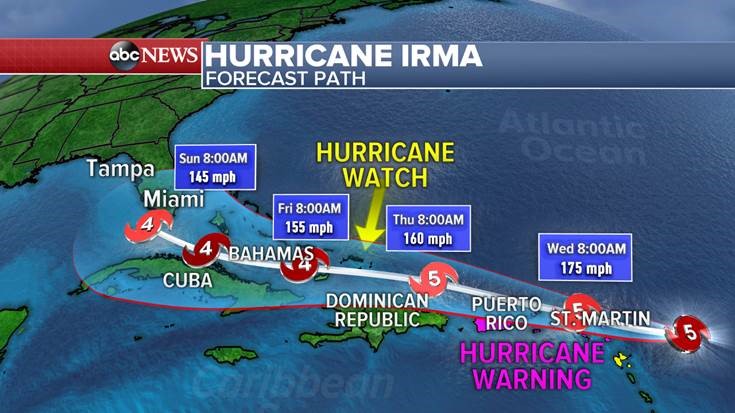How to survive Irma

WHAT IS A HURRICANE?
A hurricane is a type of tropical cyclone that can cause torrential rains, high winds, storm surges, and flooding for 2 weeks or more over open water and can follow a path across the entire length of the eastern seaboard, its coastal areas, and barrier islands. According to the National Hurricane Center, a hurricane is primarily defined by its wind speeds, which must be 74 mph or greater (anything less, and the cyclone is classified as a tropical storm).
FEMA SAFETY GUIDELINES FOR HURRICANES
Before a Hurricane
Make plans to secure your property. Permanent storm shutters offer the best protection for windows. A second option is to board up windows with ⅝” marine plywood—cut to fit and ready to install. Tape does not prevent windows from breaking.
Install straps or additional clips to securely fasten your roof to the frame structure. This will reduce roof damage.
Trim trees and shrubs around your home to minimize the risk of broken branches and debris.
Clear loose and clogged rain gutters and downspouts to prevent misdirected flooding.
Determine how and where to secure your boat.
Consider building a safe room.
Keep articles in your basement elevated to avoid damage from even minor flooding.
Keep a well-stocked Emergency Survival Kit in case you lose power. Think about what you might need if you are isolated for a number of days and must endure a power outage.
Fully fuel your vehicles.
During a Hurricane
If a hurricane is likely in your area, you should:
Stay informed by monitoring the storm via radio, TV, and internet.
Secure your home, close storm shutters, and secure outdoor objects or bring them indoors. Objects such as lawn furniture, trash barrels, hanging plants, toys, and even awnings can be broken and picked up by strong winds and potentially become a projectile.
Turn off utilities if instructed by authorities to do so. Otherwise, turn the refrigerator thermostat to its coldest setting and keep its doors closed.
Turn off propane tanks.
Avoid using the phone, except for serious emergencies.
Have a certain amount of cash available. If power is lost, ATMs may not be working.
Moor your boat if time permits.
Ensure a supply of water for sanitary purposes such as cleaning and flushing toilets. Fill the bathtub and other large containers with water.
You should evacuate under the following conditions:
If you are directed by local authorities to do so. Be sure to follow their instructions.
If you live in a mobile home or temporary structure—such shelters are particularly hazardous during hurricanes—no matter how well fastened to the ground.
If you live in a high-rise building—hurricane winds are stronger at higher elevations.
If you live on the coast, on a floodplain, near a river, or on an inland waterway.
If you feel that you are in danger.
If you are unable to evacuate, go to your safe room. If you do not have one, follow these guidelines:
Stay indoors and away from windows and glass doors.
Close all interior doors—secure and brace external doors.
Keep curtains and blinds closed. Do not be fooled if there is a lull; it could be the eye of the storm—winds will pick up again.
Take refuge in a small interior room, closet, or hallway on the lowest level.
Lie on the floor under a table or another sturdy object.
Recovering from Disaster
Recovering from a disaster is usually a gradual process. Safety is a primary issue, as are mental and physical well-being. For specific health, safety, and rebuilding guidelines regarding recovery, please see the FEMA Web site.
For more on hurricanes, see common hurricane facts and questions, how to measure hurricane strength, and a list of hurricane names for the current year. Also see How to Survive a Tornado and How to Survive a Flood.
SOURCE:
Federal Emergency Management Agency (FEMA)